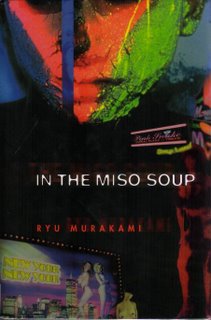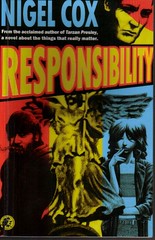Q and A by Vikas Swarup
 There seemed to be quite a buzz about this book when it came out last year. The author was booked to come over to the Auckland Readers and Writers week even before his book had been published: by the time he was here, it was said to have "taken the world by storm". He had a six figure advance and the movie is said to be already in production: not bad for a first effort. Even better when you learn he wrote it in two months, while working full time, as an Indian diplomat. He has an amazing work rate - writing 20,000 words in a single weekend! He says the story was inspired by reading of some slum kids using the internet, which suggested that no matter what our background, there might be some innate ability just waiting to be tapped (hardly a startling proposition, surely?). Plus, he wanted to have some fun with the popularity of Who Wants to be a Millionaire?
There seemed to be quite a buzz about this book when it came out last year. The author was booked to come over to the Auckland Readers and Writers week even before his book had been published: by the time he was here, it was said to have "taken the world by storm". He had a six figure advance and the movie is said to be already in production: not bad for a first effort. Even better when you learn he wrote it in two months, while working full time, as an Indian diplomat. He has an amazing work rate - writing 20,000 words in a single weekend! He says the story was inspired by reading of some slum kids using the internet, which suggested that no matter what our background, there might be some innate ability just waiting to be tapped (hardly a startling proposition, surely?). Plus, he wanted to have some fun with the popularity of Who Wants to be a Millionaire?Ram Mohammad Thomas is the central character. His name expresses the richness and diversity of India by being simultaneously Hindu, Moslem and Christian, but also indicates the lack of any fixed location within Indian social strata. Certainly, he seems to move around a lot, both geographically and socially, from the slums where he is about to be sold as a sex slave, to working for an Australian diplomat and then for a famous actress. At the time of the novel, he is an 18 year old waiter working in a bar in Delhi.
Given that employment, it comes as a surprise to the producers of quiz show Who Will Win a Billion that he is able to answer all twelve questions. Rather than pay him, they have him arrested. Before he is taken away, however, there is an interruption:
'My name is Smita Shah,' the woman announces calmly to Godbole. I am Mr Ram Mohammed Thomas's lawyer.' Then she looks at me, at my condition, and hastily averts her eyes.Of course, he doesn't know whether to trust her or not. It is decided on the flip of his much trusted one rupee coin that he will, and tell her his story. Each of the subsequent chapters are thus his account of how he came to have the right answer to each of the questions - his explanation is simply that "my life is such that I came to know the answers". For example, when he is asked what is written on the Christian Cross, he is able to answer it because he was abandoned as a baby and taken in by one Father Timothy Francis. So chapter two becomes an account of the years with Father Francis. In passing, he says that he loved going into the old church: It was an old building built in 1878, with stained glass windows and a spectacular roof made of timber. The alter was beautifully carved. Above it was a large crucifix of Christ and the letters INRI. There were sculptures of the Virgin and Child enthroned and of many saints...
Godbole is stunned. He is so stunned that he does not notice that I am equally stunned. I have never seen this woman before. I don't have money to hire a taxi. I can hardly hire a lawyer.
Other questions involved things like the smallest planet in our solar system, Shakespeare, the Taj Mahal, where he just happened to have spent some time as a tour guide. This was another great story: in a previous chapter, he had lost 50,000 rupees to a gangster on a train (and there are two other great stories as to how he obtained the money and then how he faced down the gangster). He is now wandering around Agra, where he has never been before, and sees the Taj Mahal for the very first time. Luckily it is a day of free entry: he can enter and tag along behind a group of westerners who are getting the full monty of a tour. When a group of Japanese tourists see him, they ask him for the story: he wings it, making quite a bit up ("Really? Wow! So interesting! Guide book no mention all this.") When they give him 50 rupees for his trouble, he sees his way forward, and spends more than a year learning and guiding people about the Taj Mahal. A huge amount happens to him in this chapter: he turns 17, loses his virginity, falls in love, finds he has to buy his lover out of the clutches of her pimp/brother, has all sorts of troubles at home. Throughout, however, he is a good person: it as a consequence of helping someone that when he is asked a question which completely stumps him, he has a friend to phone.
One consequence of the premise is that each chapter reads rather like a stand-alone short story, rather than have a single narrative flow through the novel (if you can call it one). As I was reading, I did become troubled as to how it was all going to end: of course, he was going to come out the winner of the billion rupees, but I was worried about the book simply finishing as a set of disjointed narratives. Swarup manages to find quite a neat device to tie things together, leading some critics to get worried about the huge number of coincidences.
Given Ram's background on the street, we wouldn't exacvtly expect a pretentious sort of novel, and it isn't. It rollocks along without making a claim to do more than be entertaining and maybe to make us think about the roles of luck, coincidence and goodness in life. That, apparently makes it "book candy".












